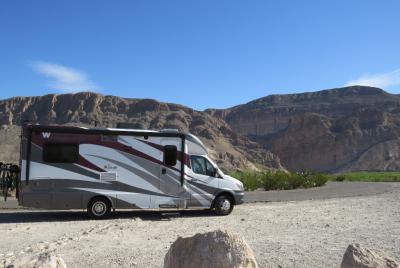Living on the Road
 I've learned a lot about RV travel from others - people I met on the road and from reading other people's travel blogs. Most of the info is about places to see, places to stay, places to eat, roads to travel.
I've learned a lot about RV travel from others - people I met on the road and from reading other people's travel blogs. Most of the info is about places to see, places to stay, places to eat, roads to travel.
But, I've found little out there about living on the road. I'm sure there are books and blogs about being a full time RVer, but I'm in between. I guess you'd call me a "sometimer." I'm still tethered to a home, a hometown, and local family, but I spend about 4-6 months of the year traveling on the road.
Living on the road is different from taking a long vacation. When you take a vacation, its a temporary break from your normal life. Its easy to put things on hold and deal with the bills, mail, appointments, routines, and conveniences when you get home. When you're on an extended road trip, you're away from your home, friends, conveniences, familiar places, and routines for an extended time and its not possible to put everything on hold.
Living on the road is not like living at home and its not like taking a long vacation. Over the past three years, I've slowly developed some practices and routines to help me cope and make it easier to be away for an extended time. I thought I'd share them here so that others may benefit from them. Everyone is different and what works for me may not work for others and vice versa.
- Stay Connected with Family - I communicate almost daily with my family. Technology makes it really easy. Text messages, emails, and Skype calls make it easier to stay in touch with family and friends. It also helps them keep track of me. I also blog about my travels to share with them. This is a priority for me.
- Go Mobile and Paperless - I've gone paperless on most bills and use electronic banking to pay bills. I can check balances, pay bills, and move money right from my smart phone. There's very little paper mail that I need and can go a few weeks without getting any paper mail.
- Have a Bank Account from a Big Country Wide Bank - I do most of my banking with a local community bank, but I maintain an account with a big countrywide bank that has branches all over the country. I can move money to this bank and I can get cash all over the country.
- Have a Full Power of Attorney - I have a Power of Attorney that gives my son (who is back home) full ability to sign my name and act on my behalf. My wife sometimes travels with me so I needed someone else back home who could do this. This has come in real handy when I've been traveling and needed someone to sign a document for me or act on my behalf.
- Carry Copies of Key Documents - I have a Health Care Proxy that allows my son to make medical decisions for me if I become incapacitated or unable to make decisions. I carry a copy in my RV. I also have photo copy of all credit cards and my ID's. I have two wallets while traveling - one on me and one that stays in the RV in case I loose the one I'm carrying. I split up my credit cards between the two and keep about $200 in the spare wallet. I also keep a photo ID in the spare wallet. I also carry a copy of my RV Title and RV insurance declaration page with me.
- Have a Doctor that Communicates Electronically - Stuff happens on the road and I let my doctors know when I'm traveling. I can communicate with all my doctors with email and all my medical records are on-line. If somethings happens, its easy to contact them and they can send prescriptions electronically to most pharmacies.
- Don't Drive Everyday - I plan a route and itinerary for every trip. Then I choose destinations to visit and have found that its best for me to stay 2-4 days at a destination. I can't be going every day. I need downtime. Time to do the things I would do at home like read, play my mandolin, read the news, watch some TV. I also need to get out and move. And need time to soak up the local flavors. I don't like to hurry. To get to a destination, I usually limit it to a two day drive.
- Build in Extra Days - When I plan a trip, I add in an extra day every couple of weeks with no itinerary. This comes in handy when I want to stay longer, do chores, or go off route.
- Only Make the Most Important Reservations - I only make advance reservations at places where it may be tough get a spot. Places like popular national or state park during busy periods. For everything else, I take it day by day. I don't want to have to juggle a collection of reservations and have to be someplace at a certain time just because of a reservation. So far this has worked out for me.
- Limit Driving Miles / Day - Back in the day when I was working and only had a few weeks vacation, I could drive 600 to 800 miles per day. Now, being retired, why hurry? I try to limit my daily driving to a max of 400 miles. My preference is to do around 200 to 250 miles. It gives you time to take breaks, smell the roses, take some pictures, and arrive at a place before sunset.
- Eat Like You Would at Home - On a vacation it is so easy to go off your diet and eat convenience foods or to eat out more than often. Because of my colitis, I need to stick to a special diet or else the "s--t will hit the fan." Whenever I can, I try to eat the same foods I would eat at home. I shop at local grocery and health food stores whenever I can and cook simple meals. I keep my favorite recipes on Evernote. But I do like to sample local foods at each destination. I just don't over do it.
- Have an RV You Can Make into a Home - I started out with a Class B van. It was great and I loved it for solo traveling, but for me, it was a tough place for 2 people to live for and extended time (2-3 months). It felt like a van vs a home and I found it was tough to sit parked in it for days when the weather was lousy. I recently traded up for a small Class C with a slide out and I love it. It feels like a home. It has a separate bathroom with a full shower, a separate bedroom that you don't have to make up each day, and a separate living/dining/kitchen area. I think this is key decision question when selecting an RV for extended traveling - can you live in it for an extended time?
- Take the Road Less Traveled - Interstates are great for getting from place to place, but I like to get off and log some miles on local roads so I can see the country side. That's were the best stuff to see is. I usually plan to do this on each destination drive.
That's my list of the stuff so far. Next week, next month, next year they'll be some more stuff I learn.
Follow more of my travels at http://jdawgjourneys.blogspot.com




3 Comments
Recommended Comments
Please sign in to comment
You will be able to leave a comment after signing in
Sign In Now